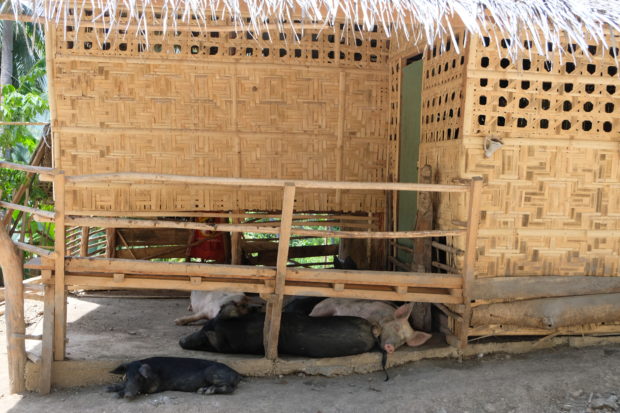
GROUND ZERO Free range pigs at Barangay Kiobog in Don Marcelino town, the ground zero of the African swine fever outbreak in Davao Occidental province, appear sluggish. Under the Department of Agriculture’s protocol, a ban on the entry and exit of pigs and pork products within a kilometer of the area where the infection was detected would be imposed, while all hogs there would be culled to stop the spread of the swine disease. —BONG S. SARMIENTO
Provinces in the Visayas are stepping up efforts to prevent the entry of pork and pork products from Mindanao following the reported cases of African swine fever (ASF) in Davao Occidental province.
The measures came as hog farm operators and dealers urged national and provincial governments to protect the Visayas from the swine disease “at all costs” even when the region had remained free of the virus.
The provincial governments of Aklan, Negros Occidental and Bohol had already issued amended orders banning live hogs and pork products from Mindanao, especially from the Davao region. The Cebu provincial government said it was planning to indefinitely extend its ban on cities and provinces that had reported cases of ASF.
Six months since the Department of Agriculture (DA) confirmed the ASF outbreak in Rizal province in Luzon, the disease—known to be fatal to hogs but not to humans—had already spread to several areas in Luzon and recently Mindanao.
Last month, the DA reported that 2,891 cases had been recorded in more than 300 villages between August and December. The number of culled pigs reached nearly 200,000 from 52,850 in November.
Rolando Tambago, Central Visayas Pork Producers Cooperative president, said his group would meet with Cebu Gov. Gwendolyn Garcia this week to discuss other containment efforts to protect the region’s livestock industry.
While President Duterte had issued an executive order implementing a zoning plan that would regulate the movement of hogs and pork products across the country, Tambago said the government had yet to update the map.
Under the zoning plan, Min¬danao is still considered ASF-free.
“The national government is not that fast in updating its zoning map, so we would rather support the initiatives of local government units (LGUs) because they know what is happening on the ground,” Tambago said, adding that “we have to contain the whole Visayas and protect its borders.”
Renante Decena, provincial veterinarian of Negros Occidental, also said they would follow the instructions of LGUs since the DA did not have “clear-cut” directives.
Contingency plansHe also recommended that the national government must “let the LGUs decide and create their own contingency plans” to better address the spread of the disease.
Negros Occidental and Bohol provinces in the Visayas have banned the entry of live pigs, pork and pork-related processed products from Mindanao to protect their areas from the ASF.
“Such incidence of ASF poses a great threat to the province, one of the gateways of livestock and meat products to Panay [Island] and Luzon,” Negros Occidental Gov. Eugenio Jose Lacson said.
Acting Bohol Gov. Rene Relampagos said ASF was now a major threat considering its proximity and accessibility to the province.
In Benguet province, Gov. Melchor Diclas also banned the entry of live pigs to prevent the spread of the disease.
In an executive order he issued on Feb. 5, Diclas said the samples they sent for laboratory testing were positive for ASF.
Local health officials blamed the ASF infestation in Benguet on “unscrupulous shippers” who used fake documents and misdeclared the sources of their hogs.—With a report from Inquirer Northern Luzon